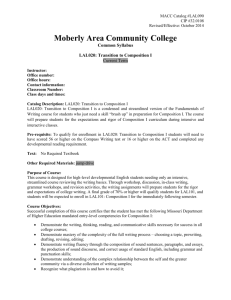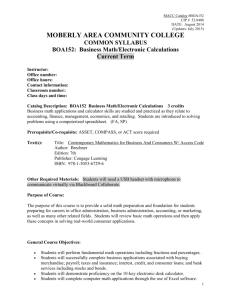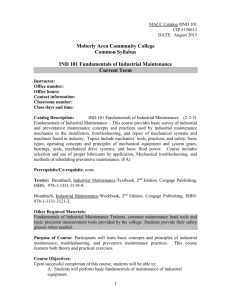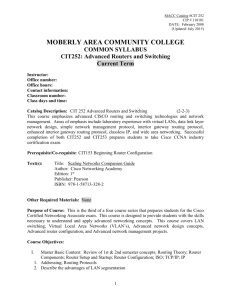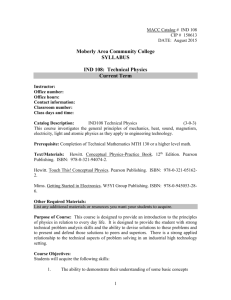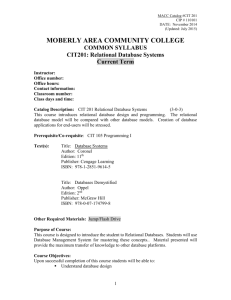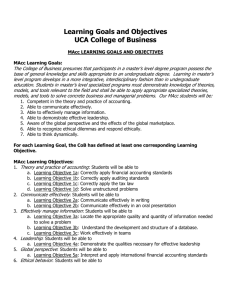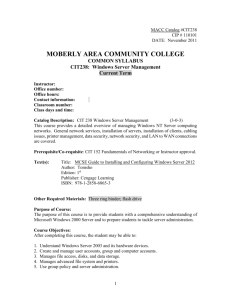ECE 210 Early and Middle Childhood
advertisement
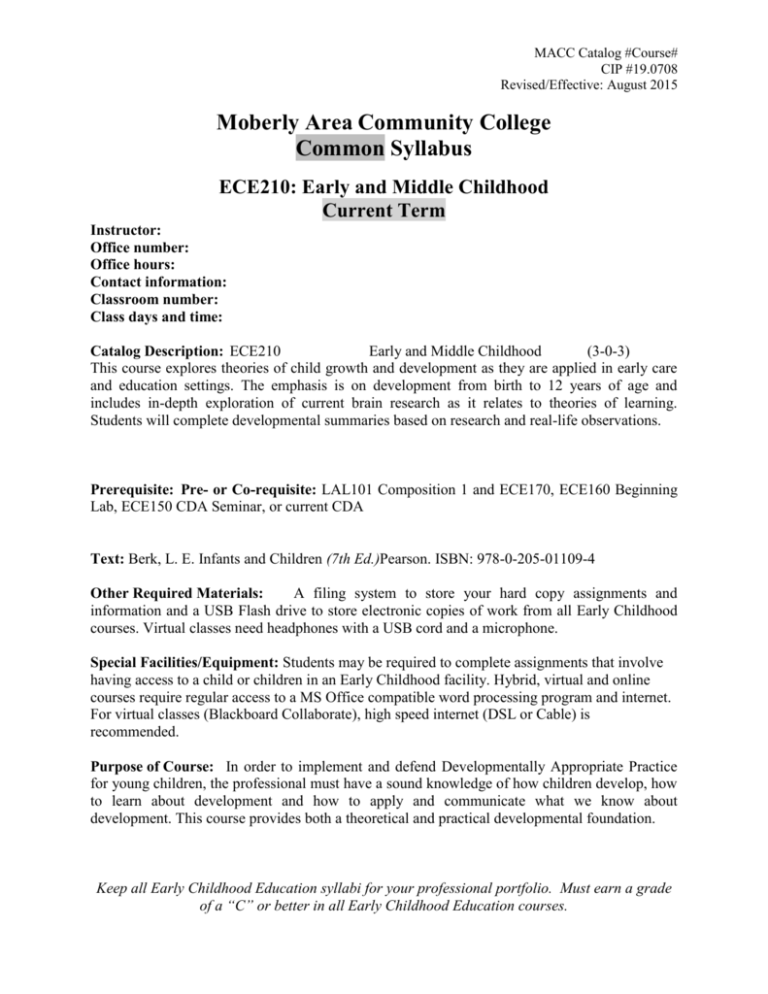
MACC Catalog #Course# CIP #19.0708 Revised/Effective: August 2015 Moberly Area Community College Common Syllabus ECE210: Early and Middle Childhood Current Term Instructor: Office number: Office hours: Contact information: Classroom number: Class days and time: Catalog Description: ECE210 Early and Middle Childhood (3-0-3) This course explores theories of child growth and development as they are applied in early care and education settings. The emphasis is on development from birth to 12 years of age and includes in-depth exploration of current brain research as it relates to theories of learning. Students will complete developmental summaries based on research and real-life observations. Prerequisite: Pre- or Co-requisite: LAL101 Composition 1 and ECE170, ECE160 Beginning Lab, ECE150 CDA Seminar, or current CDA Text: Berk, L. E. Infants and Children (7th Ed.)Pearson. ISBN: 978-0-205-01109-4 Other Required Materials: A filing system to store your hard copy assignments and information and a USB Flash drive to store electronic copies of work from all Early Childhood courses. Virtual classes need headphones with a USB cord and a microphone. Special Facilities/Equipment: Students may be required to complete assignments that involve having access to a child or children in an Early Childhood facility. Hybrid, virtual and online courses require regular access to a MS Office compatible word processing program and internet. For virtual classes (Blackboard Collaborate), high speed internet (DSL or Cable) is recommended. Purpose of Course: In order to implement and defend Developmentally Appropriate Practice for young children, the professional must have a sound knowledge of how children develop, how to learn about development and how to apply and communicate what we know about development. This course provides both a theoretical and practical developmental foundation. Keep all Early Childhood Education syllabi for your professional portfolio. Must earn a grade of a “C” or better in all Early Childhood Education courses. MACC Catalog #Course# CIP #19.0708 Revised/Effective: August 2015 “Statement to Connect Course with General Education Outcomes or Technical Education Program Objectives:” In compliance with MACC’s Early Childhood Education Program Assessment Plan, the student who successfully completes this course will be able to meet the following Program Objectives: 1.0 3.0 7.0 9.0 18.0 Know and understand young children’s characteristics, needs, major theories of development and multiples influences on young children’s development and learning, and possible interactions among influences. Know about and understand family development and systems; understand family and community characteristics and dynamics as they affect young children and early childhood practices. Practice responsible assessment to promote positive outcomes for each child, by compiling and interpreting assessment data to plan appropriate learning experiences. Use a broad repertoire of developmentally appropriate teaching/learning approaches, understanding that their details vary depending on children’s ages, characteristics, and the settings within which teaching and learning occur. Demonstrate effective written and oral communication skills using Standard English. Course Objectives: 1.1.1 Apply the universal, individual and contextual influences on development to early childhood. 1.2 Analyze development in and across the physical, motor, emotional, social, language and cognitive domains over the first eight years of life 1.3 Analyze the bidirectional relationships between nature and nurture 1.4 Compare universal needs of children at each stage of development in the first 8 years 1.5 Synthesize the major theoretical perspectives of child development into a personal theory of child development. 3.1 Recognize and demonstrate respect for the effect of variations in cultural backgrounds and family lifestyles on a child's development. 7.1 Relate developmental theory and research to observed behavior in natural settings (multiple contexts). 9.2 Balance independent exploration, scaffolding and direct teaching within intentional planning to enhance physical, cognitive, language, social, and emotional development and learning in the content areas. 18.1 Incorporate ideas and information from readings and personal reflection into own writing 18.2 Produce effective written communication for the purpose and audience Keep all Early Childhood Education syllabi for your professional portfolio. Must earn a grade of a “C” or better in all Early Childhood Education courses. MACC Catalog #Course# CIP #19.0708 Revised/Effective: August 2015 Course Content: Assessment of Student Learning: 90-100% A 80-89% B 70-79% C If you receive a grade below a C you will have to retake the course. 60-69% D Below 60% F Please keep in mind that at the college level it is expected that you will spend 2—3 hours per week on homework for each credit hour earned for the course. This is a X-credit hour course, so you should expect to spend X*2—X*3 hours studying each week. Description of Major Assignment(s)/Project(s): Points Possible: Instructor Policies: Attendance: Any student who misses two consecutive weeks of class during a regular sixteen week semester or the equivalent proportion of the class time during a shorter session will be dropped from the class by the instructor unless acceptable justification is supplied. Additionally, any student who misses more than one-fourth of the entire number of in-seat class meetings in a regular 16- week semester or the equivalent proportion of class time during a shorter session, may be dropped from that class by that instructor if, in the opinion of the instructor, the student does not have reasonable opportunity to succeed in the class. A student’s attendance rate will be calculated based upon first day of semester (not the student’s date of enrollment in the course). For online, hybrid, and virtual courses: Student attendance in these courses is defined as active participation in the course. Online, hybrid, and virtual courses will, at a minimum, have weekly mechanisms for student participation, such as any or all of the following methods: a. Completion of quizzes or exams b. Submission of assignments c. Participation in threaded discussions d. Communication with the instructor A student who does not participate in an online, hybrid, or virtual course for two consecutive weeks will be dropped by the instructor unless acceptable justification is supplied. As with ground courses, a student’s attendance rate in online courses will also be calculated based upon the first day of the semester. If a student does not demonstrate active participation in the online course within the first two weeks (or the equivalent proportion of class time during a short Keep all Early Childhood Education syllabi for your professional portfolio. Must earn a grade of a “C” or better in all Early Childhood Education courses. MACC Catalog #Course# CIP #19.0708 Revised/Effective: August 2015 session), the student will be dropped as “never attended”. Simply logging into an online class does not constitute active participation. For Virtual/Blackboard Collaborate Attendance: In a virtual class participation includes being able to hear and respond orally during Blackboard Collaborate sessions. A working headset is mandatory to meet this requirement. If there is a technology glitch that disconnects freezes or otherwise interferes with the instructor’s transmission, you are expected to wait ten (10) minutes before leaving Blackboard Collaborate. If the instructor is not able to reconnect, or communicate with you through Blackboard Collaborate, after 10 minutes, she will post an announcement in Tristate with further instructions as soon as possible. Note: Although it is the student’s right to make judgments about the legitimacy of his/her absence from class, the instructor must follow college policy. It is important to notify your instructor in writing or by email in advance of planned absences and as soon as possible in the event of emergency absences, Assignments do count as part of your attendance and should be turned in even when absent. However, the instructor makes every effort to make class time valuable to student success, so absences (including tardiness or leaving early) do affect the student’s ability to be successful in the course and may lead to dismissal or failure. Therefore, it is recommended that you make arrangements with another student to get notes, handouts and assignments. DO NOT contact instructor for this information. Students should be aware that dropping a course and their last date of attendance in the course may impact their financial aid. Tardiness: Per instructor’s policy Make-up and late work: All assignments should be submitted by [time] of the date due. You may have a one week extension on three assignments during the semester. You must contact the instructor by email within 24 hours of the due date and time. If contact is not made within 24 hours, a 25% deduction from the final grade will be assessed for the 24 hours after the original deadline. There will be an additional 25% deduction for each additional 24 hours the assignment is late. That means the best grade you can get on this late work is a “C” and after four days it is a “0”. Since you have three free passes, there will be no further appeals accepted for late work. Extra-Credit: Per instructor policy. Must show improved mastery of the specific content of the course. It should only be granted to students who have submitted all regular work on time. An example: There may be occasional opportunities to earn additional points in this class by completing supplementary assignments to improve mastery of material you found difficult. To be eligible for this extra credit, all regular assignments must have been submitted on time. In keeping with the program emphasis on writing skills, you may also earn an extra credit point by correcting a written error in handouts or tests produced by the instructor. Submit your correction in writing. Keep all Early Childhood Education syllabi for your professional portfolio. Must earn a grade of a “C” or better in all Early Childhood Education courses. MACC Catalog #Course# CIP #19.0708 Revised/Effective: August 2015 Using other Sources: Educators commonly borrow ideas and activities from books, other teachers, co-workers, students, the Internet, magazines, workshops, etc. While it is permissible to use these resources, it is important that you tell us where you found the idea. Failure to do so is plagiarism. At a minimum, you need to cite the name of the author and title of the source or the person’s name. Academic Dishonesty: MACC board policy is as follows: “Academic dishonesty by students damages institutional credibility and unfairly jeopardizes honest students; therefore, it will not be tolerated in any form.” Forms of academic dishonesty include but are not limited to the following: violations of copyright law, plagiarism, fabrication, cheating, collusion, and other academic misconduct. Incidents of dishonesty regarding assignments, examinations, classroom/laboratory activities, and/or the submission of misleading or false information to the College will be treated seriously. The procedure for handling academic dishonesty is outlined in the Student Handbook (Policy Handbook M.010). In cases of alleged academic dishonesty, the burden of proof is on the student, not on the instructor. Internet Requirements: As is the nature of an Online or Hybrid course, the bulk of the work required for student assessment must be submitted through the Tristateonline eCollege environment. This requires regular access to a word processing program and internet. If using Blackboard Collaborate, high speed internet (DSL or Cable) is recommended. If you are having difficulties logging onto Tristate contact Instructional Technology at MACC 800-622-2070 Ext. 11302 or 11303 during the regular business day or email int@macc.edu. If you are having technical difficulties with Tristateonline, contact their Help Desk 24/7 at helpdesk@tristateonline.org or by calling 877 740-2213. If you are having difficulties with Blackboard Collaborate, contact their helpline at 877-3822293 or go to http://support.blackboardcollaborate.com/ics/support/default.asp?deptID=8336&task=knowledge &questionID=1 Additional helpful information about navigating the online environment is available in the last unit of your course, “Helpful Information”. ADA Statement: Students who have disabilities that qualify under the Americans with Disabilities Act may register for assistance through the Office of Access and ADA Services. Students are invited to contact the Access/ADA Office to confidentially discuss disability information, academic accommodations, appropriate documentation and procedures. The Office of Access and ADA Services is located in the Main Library and the phone number is (660) 2634100 ext. 11240. Students may also contact the Columbia office at 573-234-1067 ext. 12120. Title IX Statement: MACC maintains a strict policy prohibiting sexual misconduct in any form, including sexual harassment, sexual discrimination, and sexual violence. All MACC employees, including faculty members, are considered mandated reporters of sexual misconduct and as such Keep all Early Childhood Education syllabi for your professional portfolio. Must earn a grade of a “C” or better in all Early Childhood Education courses. MACC Catalog #Course# CIP #19.0708 Revised/Effective: August 2015 are expected to contact the Title IX Coordinator when they become aware, in conversation or in writing, of an incident of sexual misconduct. For more information on this policy or to learn about support resources, please see http://www.macc.edu/sexual-misconduct-policy or contact Dr. Jackie Fischer, MACC’s Title IX Coordinator, at 660-263-4110, ext. 11236 or jackief@macc.edu. Schedule of Student Assignment and Activities: Instructors will identify a Student Assignment/Activities schedule. Instructors have the prerogative to construct the schedule by class periods, weeks, or an overview of topics to be covered. Keep all Early Childhood Education syllabi for your professional portfolio. Must earn a grade of a “C” or better in all Early Childhood Education courses.

